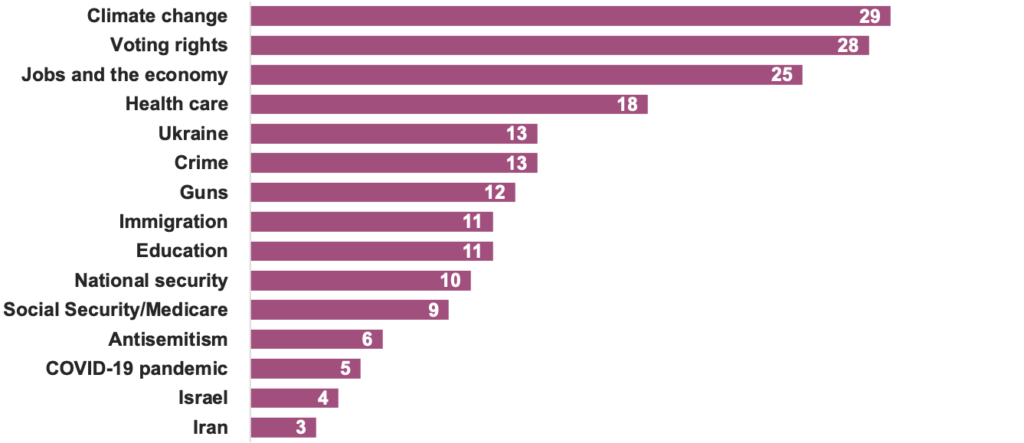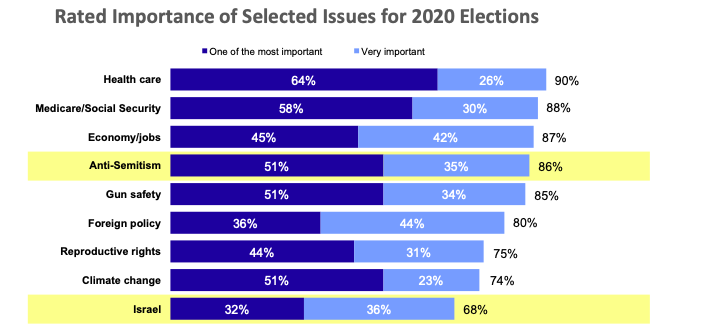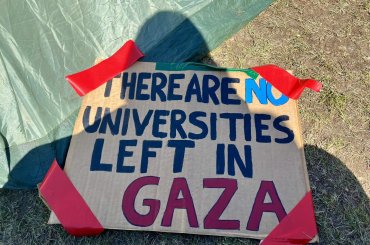American Jews overwhelmingly support the renewal of the Iran deal, and very few American Jews consider Israel a political priority, according to a new survey of American Jewish voters.
Jews support a return to the Iran deal by 68-32, the Jewish Electoral Institute found in a poll of 800 Jews this spring. The proportion is nearly 4-to-1 among Reform Jews (79-21) and women (77-23). And Jews over 65 are for the deal by a larger percentage (72-28) than Jews under 40. Only the orthodox are against the Iran deal, by 85-15! But orthodox make up just 9 percent of the Jewish population.
Now here’s the indifference to Israel question.
Voters were asked to say which two issues they wanted the president to focus on. Israel got clobbered. Only 4 percent listed it as one of their two issues.

When you break it out by denomination, it’s even starker. 1 percent of non-denominational Jews and 2 percent of Reform Jews think Israel should be a priority. And those two groups make up more than two-thirds of American Jews — 31 percent non-denominational, 37 percent Reform. Though 5 percent of Conservative and 18 percent of Orthodox Jews see Israel as a priority.
Other issues are just way more important. 42 percent of nondenominational Jews say climate change should be a top priority; 32 percent say voting rights; 12 percent say crime.
Of course the low Israel number may reflect the fact that the Israel lobby has got most Democrats under its wing already, to the point that Biden won’t criticize the occupation. So if the issue is not politicized, who needs to worry about it?
But the poll is consistent with other trends: a survey in 2007 showing that young Jews were becoming alienated from Israel, with only about half of those under 35 saying Israel’s end as a Jewish state would be a personal tragedy. And a survey by the Jewish Electoral Institute a year ago saying a quarter of Jews regard Israel as an apartheid state, and 38 percent of Jews under 40 say Israel is an apartheid state.
Polling from the Electoral Institute two and three years ago also suggests greater concern about Israel. In a 2020 survey, 68 percent of Jewish voters said a candidate’s position on Israel was somewhat or very important in choosing who to vote for. Though the poll said, “Israel remains the lowest priority for Jewish voters,” behind many other issues. (These polls apparently did not force respondents to name just two issues, as the latest one does.)

The new poll also shows that 93 percent of American Jews are concerned about antisemitism. The Reform number there is 95 percent concerned, the orthodox 96 percent, the non-denominational 89 percent concerned.
h/t Michael Arria and Adam Horowitz.



2 of 2
In the Bnei Brak attack, on March 29, for example, an Israeli woman who was at the scene told reporters that ‘the militant asked us to move away from the place because he did not want to target women or children.’
“While Israeli intelligence reports have recently warned of a ‘wave of terrorism’ ahead of the holy month of Ramadan, they clearly had little conception of what type of violence, or where and how Palestinians would strike.
“Following the Beersheba attack, Israeli officials referred to Daesh’s responsibility, a convenient claim considering that Daesh had also claimed responsibility. This theory was quickly marginalized, as it became obvious that the other Palestinian attackers had other political affiliations or, as in the Bnei Brak case, no known affiliation at all.
“The confusion & misinformation continued for days. Shortly after the Tel Aviv attack, Israeli media, citing official sources, spoke of two attackers, alleging that one was trapped in a nearby building. This was untrue as there was only one attacker and he was killed, though hours later in a different city.
“A number of Palestinian workers were quickly rounded up in Tel Aviv on suspicion of being the attackers simply because they looked Arab, evidence of the chaotic Israeli approach. Indeed, following each event, total mayhem ensued, with large mobs of armed Israelis taking to the streets looking for anyone with Arab features to apprehend or to beat senseless.
“Israeli officials contributed to the frenzy, with far-right politicians, such as the extremist Itamar Ben Gvir, leading hordes of other extremists in rampages in occupied Jerusalem.
“Instead of urging calm & displaying confidence, the country’s own Prime Minister called, on March 30, on ordinary Israelis to arm themselves. ‘Whoever has a gun license, this is the time to carry it,’ he said in a video statement. However, if Israel’s solution to any form of Palestinian resistance was more guns, Palestinians would have been pacified long ago.
“To placate angry Israelis, the Israeli military raided the city & refugee camp of Jenin on many occasions, each time leaving several dead & wounded Palestinians behind, including many civilians…”
1 of 2
Palestine’s Widening Geography of Resistance: Why Israel Cannot Defeat the Palestinians | UPROOTED PALESTINIANS: SALAM ALQUDS ALAYKUM (wordpress.com)
“Palestine’s Widening Geography of Resistance: Why Israel Cannot Defeat the Palestinians” April 13, 2022 by Ramzi Baroud.EXCERPT:
“There is a reason why Israel is insistent on linking the series of attacks carried out by Palestinians recently to a specific location, namely the Jenin refugee camp in the northern West Bank. By doing so, the embattled Naftali Bennett’s government can simply order another deadly military operation in Jenin to reassure its citizens that the situation is under control.
“Indeed, on April 9, the Israeli army has stormed the Jenin refugee camp, killing a Palestinian & wounding ten others. However, Israel’s problem is much bigger than Jenin.
“If we examine the events starting with the March 22 stabbing attack in the southern city of Beersheba (Bir Al Saba’) – which resulted in the death of four – & ending with the killing of three Israelis in Tel Aviv – including two army officers – we will reach an obvious conclusion: these attacks must have been, to some extent, coordinated.
“Spontaneous Palestinian retaliation to the violence of the Israeli occupation rarely follows this pattern in terms of timing or style. All the attacks, with the exception of Beersheba, were carried out using firearms. The shooters, as indicated by the amateur videos of some of the events & statements by Israeli eyewitnesses, were well-trained & were acting with great composure.
“An example was the March 27 Hadera event, carried out by two cousins, Ayman & Ibrahim Ighbariah, from the Arab town of Umm al-Fahm, inside Israel. Israeli media reported of the unmistakable skills of the attackers, armed with weapons that, according to the Israeli news agency, Tazpit Press Service, cost more than $30,000.
“Unlike Palestinian attacks carried out during the Second Palestinian Intifada (2000-05) in response to Israeli violence in the occupied territories, the latest attacks are generally more pinpointed, seek police & military personnel & clearly aimed at shaking Israel’s false sense of security & undermining the country’s intelligence services.(cont’d)
Lara Friedman Retweeted
Shibley Telhami @ShibleyTelhami 20h
The partisan divide on US-Israel ties could hardly be deeper: Asked to name two most important US allies, 20% of Republicans list Israel first, second only to UK and ahead of key NATO allies. For Democrats, Israel seems an afterthought: <1% list Israel, behind eight others.
LINK – https://twitter.com/ShibleyTelhami/status/1514706958456135689